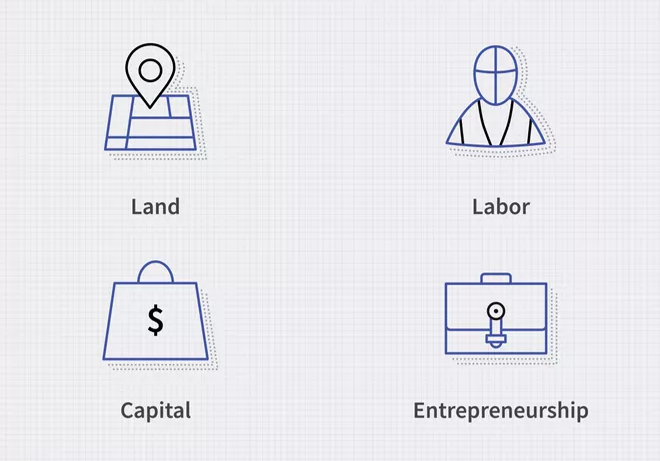
Data – A New Factor of Production
The next generation wars will be fought in the virtual world for capture of data.
Traditional economics recognizes four factors of production:

Land includes all the natural resources — water, oil, ores, natural gas, coal, and forests etc.
Labor is the effort that people contribute to the production of goods and services.
The capital is meant for the machinery, tools and buildings, the labor uses to produce goods and services.
The entrepreneur combines these factors of production to generate profit.
Data in form of information has always been important for the efficiency and productivity of factors of production. For example, if you are a village entrepreneur producing earthen pots, you need to know the expected demand of the area served, your market share, competitive price considering the price of similar pot offered by your competitors, how you can differentiate your product and so on. For a farmer, the importance of data for the yield of a crop, rainfall, nutrition level of the land, quality of seed etc., needs no emphasis.
The traditional factors of production have been the root cause of most of the battles in the history of humankind. The control over these factors of production was the prime motive behind the conquests of Alexandra in the BC era to large scale colonialization in modern history. Again data was extensively used in these battles to map the factors of production and to plan winning strategies to control them. However, have we ever come across any battle which was fought to gain hegemony over data in the history? We do not think so.
The relevance of land and labor has diminished significantly in recent years since the agricultural and industrial revolution days. The distinguishing factor which has gained prominence is ‘access to data and the capability to process it effectively for growth’. The data is the driving force for a platform-based economy fueling the growth of companies like Amazon, Uber, Airbnb, Facebook, Twitter and many more. It is not surprising that the biggest taxi company (Uber) does not own any vehicle, Airbnb, the world’s largest accommodation provider, owns no real estate. There are many such examples.
Data as asset
So what do these tech giants have — volumes of data both structured and unstructured which they can harness to target their customers and run the most profitable businesses. The old saying ‘Knowledge is power is gradually being replaced by ‘Data is power. With the increasing importance of data, it will not be incorrect to say that data is emerging as a vital factor of production in the modern economy. An entrepreneur working from the smallest of the office in a remote location having access to a computer, internet connection and data may run a profitable business depending upon how he/she uses the data. The emergence of unicorns in India over the last 2-3 years is an example of how data has empowered so many to grow.
In 2020, the National Development and Reform Commission (NDRC), China has declared data as one of the factors of production. NDRC has stated “Today, new production factors such as data have a multiplier effect on the efficiency of other factors, forming advanced productive forces.” Harnessing data in ways that creates new insight and ideas are increasingly coming from data-driven applications. The analytic views provided by these data-driven applications are fueled by the volume, velocity, variety and veracity of data available to an organization — which may boost productivity in a big way. In a study conducted by the University of Texas, Austin over 150 Fortune 1000 firms from every major industry or vertical, found that five attributes of data (quality, usability, intelligence, remote accessibility and sales mobility) have a dramatically positive effect on key financial measures.
Access to data
Unsurprisingly, the tech giants having understood the value of data are fiercely competing to gain access to more and more data. Amazon, Netflix, Airbnb, Facebook, Twitter etc. have become market leaders due to access to large volumes of data and their ability to crunch this data productively. These companies empowered by data — a new factor of production — are daring to challenge the power of sovereign nations. In his book ‘AI Superpowers’, Kai-Fu Lee describes a Wild West era in which tech companies will be free to battle for dominance with little government intervention. This seems familiar wherein European trading companies established their supremacy over sovereign nations in the Industrial Revolution era.
It is said that the next-generation wars will not be fought in the battlegrounds. The field for wars in the data-driven society will be a virtual space where fighting states will not capture the land of each other but will try to capture data and compromise the digital networks to inflict damages on the enemy. The ransomware on Colonial Pipeline of the US in May 2021 which halted all pipeline operations for around a week till ransom amount was paid to the attackers is an example of how data can become a new ground of wars among the countries.

The biggest challenge for protecting data is its non-rivalrous nature i.e. consumption of data by one doesn’t affect the availability of the same data for another. The same data can be replicated multiple times and millions of copies can be created. Unlike land or other assets, the owner of the data may not be even aware when confidential data has been stolen by the enemy.
The recent strict regulatory measures adopted by the Chinese government to rein its tech companies thriving on data are indeed targeted towards control of data. The Chinese government sees data as a critical factor of production to its efforts to become a leader in emerging technologies, especially in AI.
Conclusively, in this new world, the winning strategy for any entity will be to identify relevant data, mine it, clean it and use it for getting a better insight into the business environment. Data needs to be treated as an important factor of production which should like any other factor of production be used efficiently to improve productivity and gain competitive advantage over others. Data management including protection thereof is the new competitive advantage that an entity shall strive for to gain market share. The Data Protection Bill (DPB) 2021 which seeks to regulate the collection and processing of both personal data and non-personal data (NPD), is perhaps the need of the hour.


